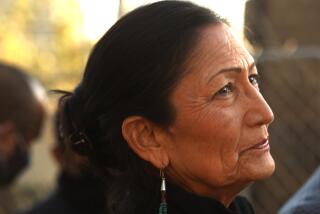Court acquits man of assault because he isn’t an Indian
- Share via
A Montana man has been acquitted of assault charges by a federal appeals court because he doesn’t meet the definition of an Indian, never having joined the Blackfeet tribe from which his mother descended or accepted federal benefits to which Native Americans are entitled.
Tuesday’s ruling by the 9th U.S. Circuit Court of Appeals could raise jurisdictional problems for prosecutors across the court’s nine-state Western region, where federal courts are responsible for trying Indians on Indian territory.
Christopher Patrick Cruz, now 21, is the son of a Latino father and a mother with slightly less than half Blackfeet blood. Although he spent a few years as a child on reservation land in Browning, Mont., he never joined the tribe or enrolled in tribal or federal benefit programs.
“This has application for all of what we call in jurisdictional parlance ‘Indian territory,’ ” said R. Henry Branom Jr., the assistant federal defender who represented Cruz before the appeals court and will do so again if the government requests a rehearing.
Bill Mercer, assistant U.S. attorney in Montana, said he would be reviewing the ruling with colleagues in Washington but that he was “disappointed with the 9th Circuit’s decision.”
Cruz, whose federal district court conviction has been deemed erroneous by the appeals court, will remain imprisoned until the government exhausts or forgoes appeals options.
He cannot be retried in another venue because of Montana’s strict protections against double jeopardy, Branom said.
The charges of assault resulting in serious bodily injury arose from a December 2006 night of drinking and brawling at the Town Motel in Browning, where Cruz, then 19, had recently relocated.
The appeals court panel noted its 2005 ruling that established a test of an individual’s Indian status, defining it as requiring a “sufficient degree of Indian blood” as well as “tribal or federal government recognition as an Indian.”
Cruz conceded he qualified as an Indian under the blood test. He also had attended a tribal school and worked for the Bureau of Indian Affairs as a firefighter.
But because he never enrolled in the tribe or applied for federally funded benefits to which Indians are entitled, he failed the latter test, Branom had argued to the appeals court.
Two of the three judges -- both appointed by Democratic presidents -- agreed, while Chief Judge Alex Kozinski, named to the federal bench by President Reagan, dissented.
Kozinski pointed out that Cruz had previously been prosecuted by tribal authorities, establishing that they considered him an Indian. The libertarian chief judge also argued that the appropriate test should be “whether the tribal authorities recognize [someone] as an Indian, not whether he considers himself one.”
--
More to Read
Sign up for Essential California
The most important California stories and recommendations in your inbox every morning.
You may occasionally receive promotional content from the Los Angeles Times.














